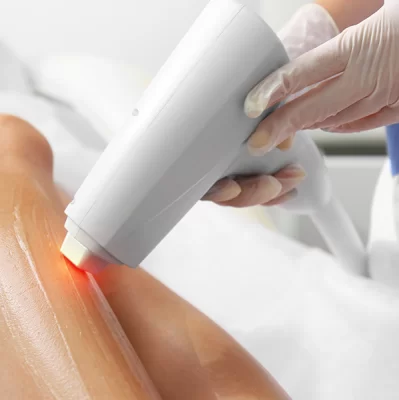Laser hair removal: how to prepare?
- What hair removal methods should be avoided before the procedure?
- Why should you avoid tanning before laser hair removal?
- What medications, herbs, and supplements should be avoided before a procedure?
- What cosmetics should not be used on the skin before depilation?
- How to properly shave skin on the day of the procedure?
- What are the main contraindications for laser hair removal?
- What is the importance of consulting with a specialist before a procedure?
When preparing for laser hair removal, it is important to avoid any hair removal methods that pluck the hair from the root for 4-6 weeks before the planned treatment. This means completely avoiding waxing, tweezing, using epilators, or sugaring paste.
Why is this so important? The laser works precisely on melanin, the pigment located directly in the hair follicle. If the hair follicle is removed, the laser beam will not have a target, making the whole process ineffective. The only allowed and recommended way to prepare the skin for the treatment is by regularly shaving the hair with a razor.
Before planned laser hair removal, it is extremely important to follow the rules that will ensure the safety and effectiveness of the treatment. At least 4-6 weeks before the procedure, it is worth avoiding sun exposure and visits to the solarium. Also, 2-3 weeks before the session, it is necessary to completely stop using self-tanners.
A fresh tan is an absolute contraindication for laser hair removal. The energy of the laser, which targets the hair pigment, in the presence of a tan, can also be absorbed by the skin itself, not just the hair follicle. This can result in serious complications, such as painful burns, irritations, discoloration, and even scars.
Before starting laser hair removal, it is necessary to stop using photosensitizing substances. If you are taking oral retinoids, such as Accutane, discontinue them at least 6 months before the planned procedure.
2-3 weeks before hair removal, also avoid certain herbs, including St. John's wort, marigold, horsetail, or nettle. At the same time, stop taking supplements containing vitamins A, E, and C.
2 days before hair removal, it is necessary to stop taking painkillers, such as ibuprofen, as well as any blood-thinning medications. Avoiding their use is crucial to minimize the risk of adverse phototoxic reactions and ensure the safety of the procedure.
Equally important is to discontinue the use of certain cosmetics. 4 weeks before the treatment, you should refrain from using products containing:
- retinoids,
- vitamin A,
- vitamin C,
- fruit acids,
- salicylic acid.
Adhering to all of these guidelines is the foundation of the effectiveness and safety of the entire laser hair removal procedure.
2-3 weeks before the planned laser treatment, make sure to avoid intense peels, including the use of chemical exfoliants and microdermabrasion. During this time, also steer clear of products containing essential oils or other irritating or photosensitizing substances.
On the day of the laser hair removal, your skin must be absolutely clean, dry, and completely free of any cosmetics. Avoid using balms, moisturizers, oils, or perfumes. Make sure to remove makeup. If you are getting your underarms treated, refrain from using deodorants and antiperspirants.
Before laser hair removal treatment, it is essential to shave the skin with a disposable razor. Perform this action on the day of the appointment or the day before. Make sure the skin is perfectly smooth.
Leaving longer hair on the skin significantly reduces the effectiveness of the laser treatment and also increases the risk of irritation and even burns on the skin. However, avoid shaving a few days before the procedure as the hair might regrow by then.
Laser hair removal, although effective, has certain limitations. There are conditions that completely prevent its performance. The absolute contraindications to this procedure include:
- pregnancy,
- breastfeeding,
- cancerous diseases,
- active skin infections, such as herpes,
- interrupted skin continuity,
- skin disorders, e.g. vitiligo, psoriasis, or photodermatoses,
- epilepsy, - presence of a heart pacemaker or implants,
- tendency to develop keloids,
- tattoos in the area undergoing treatment.
Relative contraindications include menstruation (especially in the case of bikini depilation) and general weakness of the body.
Consultation before laser hair removal is a key element of preparation for the procedure that must be carried out by an experienced cosmetologist. Its purpose is to ensure the safety and effectiveness of the treatment by excluding any contraindications to its performance.
During this visit, the specialist:
- conducts a detailed medical interview to learn about your health condition,
- carefully assesses your skin phototype and condition,
- analyzes the color and thickness of your hair,
- based on the gathered information, precisely selects the optimal laser parameters, perfectly tailored to your individual needs,
- discusses the details of the procedure and all post-treatment recommendations,
- often performs a laser test to check your skin's reaction to the device's action.
